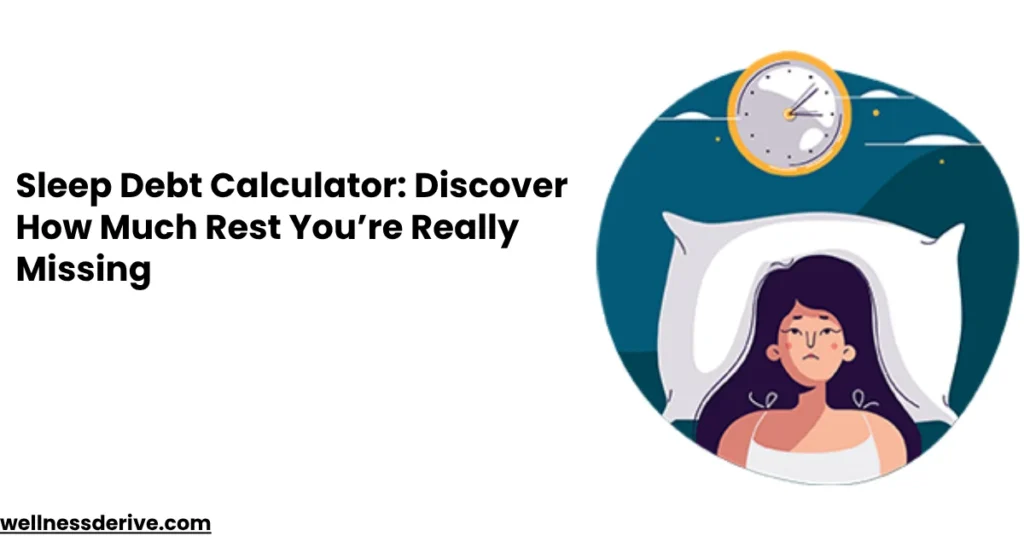Track Your Sleep Health
Discover if you’re getting enough rest with our Sleep Debt Calculator. Simply enter your sleep hours over several days to see if you’re meeting your recommended sleep needs based on your age group.
Sleep Debt Calculator
💡 Sleep Tips
- Maintain a consistent sleep schedule
- Avoid screens 1 hour before bedtime
- Keep your bedroom cool and dark
- Limit caffeine after 2pm
Sleep Debt Calculator: Discover How Much Rest You’re Really Missing

Have you ever asked yourself, “How much sleep debt do I have?” If so, you’re not alone. In our fast-paced world, missing out on sleep has become all too common — and the consequences are more serious than many realize. That’s where a sleep debt calculator becomes an essential tool.
Whether you’re sleep-deprived from late-night studying, shift work, or just a packed schedule, calculating your sleep debt can help you understand how much rest you’ve lost and how to recover it effectively.
What Is Sleep Debt?

Sleep debt — sometimes called sleep deficit — is the gap between the amount of sleep your body needs and the amount you actually get. For example, if your body needs 8 hours of sleep each night and you only get 6, you accumulate 2 hours of sleep debt per night. Over time, this can impact not only physical performance but also body weight, as chronic sleep loss is linked to hormonal imbalances, increased appetite, and slower metabolism.
Over time, this “debt” adds up. If left unchecked, it can lead to a variety of physical and mental health issues, including:
- Reduced cognitive function
- Mood disturbances
- Weakened immune system
- Increased risk of chronic conditions
Still wondering, “Is sleep debt a real thing?” Yes, it is. Research shows that even small deficits in nightly sleep can impact your brain and body over time.
How Is Sleep Debt Calculated?
Understanding how to calculate sleep debt is simpler than it sounds. Here’s the basic formula:
Sleep Debt = (Recommended Sleep – Actual Sleep) × Number of Days
Example:
If an adult needs 8 hours/night but sleeps 6 hours for 5 nights:
- (8 – 6) × 5 = 10 hours of sleep debt
Using a dedicated sleep debt calculator automates this math, allowing you to enter your sleep data over 7 to 14 days and instantly receive your total sleep deficit. You can also use tools like a sleep deprivation calculator or sleep deficit calculator for detailed tracking and trend analysis.
According to a landmark study by Van Dongen et al. (2003), sleep debt is cumulative and significantly impairs cognitive performance and alertness — even after just a few nights of restriction. That’s why accurate calculation is essential for recovery and well-being.
Try Our Free Sleep Debt Calculator
Our interactive sleep debt calculator helps you:
- Track your sleep hours
- Compare them with age-based recommendations
- Estimate how much sleep debt you’ve accumulated
- Suggest ways to recover lost sleep
Whether you’re using it as a bedtime calculator by age or to create a sleep recovery plan, this tool is built to help you sleep smarter. It’s especially useful when paired with wellness metrics like BMI, helping you understand how sleep and body composition are closely linked.
Who Should Use It?
- Teens sleeping less than 8–10 hours
- Adults consistently getting under 7 hours
- Shift workers and new parents
- Anyone with ongoing sleep issues
Also, check out our Athlete-Specific BMI Assessment
Recommended Sleep Duration by Age
To calculate sleep debt accurately, you need to know how much sleep is recommended for your age group. Here’s a helpful reference:
| Age Group | Recommended Sleep |
|---|---|
| Teenagers (14–17) | 8–10 hours/night |
| Adults (18–64) | 7–9 hours/night |
| Seniors (65+) | 7–8 hours/night |
If you’re unsure, the average adult needs about seven to eight hours of sleep per 24-hour day.
Based on guidelines from the National Sleep Foundation and the American Academy of Sleep Medicine⁴, adults should aim for 7–9 hours of sleep per night, while teens may require 8–10 hours.
How Do I Know How Much Sleep Debt I Have?
Ask yourself the following questions — think of it as your own mini sleep debt quiz:
- Do I feel tired even after sleeping 6–7 hours?
- Do I struggle to stay awake during the day?
- Have I been waking up to an alarm instead of naturally?
If you answered “yes” to these, it may be time to use a sleep debt calculator and evaluate your sleep patterns.
Signs and Symptoms of Sleep Debt
How do you know you’re experiencing sleep debt symptoms? Here are some common signs:
- Difficulty concentrating or memory issues
- Increased irritability or mood swings
- Frequent yawning or microsleeps
- Low energy, especially in the afternoon
“You can notice a sleep deficit by the following signs” — especially if you feel mentally foggy or physically drained most days of the week.
How Much Sleep Debt Can You Accumulate?
Sleep experts suggest that sleep debt can accumulate quickly — even after a few nights of short sleep. While there’s no absolute upper limit, most people can tolerate up to 10–20 hours before serious side effects kick in.
The problem? Long-term sleep debt is harder to pay off. If you’ve built up 30+ hours of debt, it can take several weeks of consistent rest to recover.
Can You Recover From Sleep Debt?
Yes, but recovery depends on how much debt you’ve built up and your consistency. If you’re wondering, “Can you pay off sleep debt?” — here’s how it works:
- For small debts: Just a few extra hours of sleep over the weekend can help.
- For larger debts: You may need to increase your sleep by 1–2 hours nightly for a week or more.
- Severe cases might require a structured sleep debt recovery plan over multiple weeks.
How Long Does It Take to Fix Sleep Debt?
The time it takes to recover depends on several factors:
- Sleep loss severity
- Age and health
- Consistency of recovery efforts
On average:
- Mild debt (under 10 hours) = 2–3 days
- Moderate debt (10–20 hours) = 4–7 days
- Large sleep debt (30+ hours) = 2+ weeks
If you’re wondering, “How long to recover from sleep debt?” or “How long does it take to fix sleep debt?” — your best answer is: it varies, but it’s possible with consistent effort.
How to Pay Off Sleep Debt Effectively
Here are practical strategies on how to pay sleep debt without disrupting your routine:
1. Sleep 1–2 Extra Hours Each Night
Rather than sleeping 12 hours straight, aim for consistency.
2. Take Short Naps (20–30 minutes)
Avoid long naps that interfere with nighttime sleep.
3. Improve Sleep Hygiene
Following simple tips to improve your sleep cycle can significantly boost sleep quality:
- Avoid screens 1 hour before bed
- Stick to a consistent sleep schedule
- Reduce caffeine after noon
4. Track Your Progress
Use a sleep debt calculator or sleep tracking app to stay accountable.
The Hidden Risk of Too Much or Too Little Sleep
While sleep debt and chronic deprivation are commonly linked to health risks, sleeping too much may also negatively impact your life expectancy. It may seem counterintuitive, but there’s a sweet spot for healthy sleep — and straying too far in either direction increases mortality risk.
How Did We Calculate the Sleep Risk?
This data is derived from a 2016 study by Shen et al., published in the journal Nature, which analyzed the relationship between sleep duration and mortality. The research compared people with varying sleep durations to a control group getting a standard 7 hours of sleep per night and without cancer or cardiovascular diseases.
The study provides insight into the percentage increase in mortality risk depending on how many hours of sleep a person typically gets per night.
Sleep Duration vs. Mortality Risk
Here’s a simplified look at the findings:
| Hours of Sleep per Day | Increase in Mortality Risk |
|---|---|
| 4 hours | +23% |
| 5 hours | +14% |
| 6 hours | +5% |
| 7 hours (baseline) | 0% |
| 8 hours | +4% |
| 9 hours | +11% |
| 10 hours | +19% |
| 11 hours | +28% |
Key Insight: Both sleep deprivation (under 6 hours) and oversleeping (over 9 hours) are linked to increased health risks. The ideal sleep duration appears to be around 7 hours per night.
Sleep Debt vs. Chronic Sleep Deprivation
Though related, these terms are different:
- Sleep debt = A shortfall in sleep over a few days or weeks
- Sleep deprivation = Ongoing inadequate sleep leading to serious health issues
A sleep deprivation calculator may be used in clinical or psychological settings to assess long-term damage from lack of sleep.
Also Read: From Stress to Sleep: How Neurology Affects Your Daily Life
Search Terms in Other Languages (Multilingual SEO)
This tool also helps international users who search terms like:
- nợ ngủ (Vietnamese for sleep debt)
- horas de sono calcular (Portuguese for “calculate sleep hours”)
Providing multilingual support improves global accessibility.
Sleep Debt Calculator vs. Bedtime Calculator
Many people confuse bedtime calculators with sleep debt calculators, but they serve different purposes:
| Tool | Purpose |
|---|---|
| Bedtime Calculator | Recommends when to go to sleep based on desired wake time |
| Sleep Debt Calculator | Measures how much sleep you’ve lost over time |
They can be used together for better sleep planning.
FAQs About Sleep Debt
Final Thoughts: Sleep Smarter, Live Better
Understanding your sleep habits is crucial to living a healthier life. A sleep debt calculator is not just a fancy tool — it’s a wake-up call for your body and brain. Whether you’re dealing with short-term tiredness or long-term fatigue, tracking and recovering from sleep debt is possible.
Don’t let your health suffer in silence. Use this calculator, follow recovery steps, and reclaim the restful nights your body deserves.
